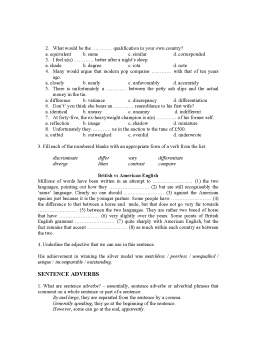Extras din curs
DIFFERENCES AND SIMILARITIES
1. Collocation – we can use a number of adjective / noun or adverb / verb collocations to say how different or similar people or things are. Other adjectives may have a similar meaning, but we can’t use them because they don’t collocate (see Lesson 1):
There’s a noted / wide / strong difference.
There’s a marked / perceptible / vast / clear difference.
2. Synonyms and near-synonyms – sometimes synonyms are virtually interchangeable:
This is one of the biggest / greatest days in our country’s history.
However, in different contexts, differences may emerge:
We need a bigger area / room / table / auditorium.
What a great idea / gesture / privilege / honour!
3. Modifiers – we often want to comment on how big a difference is. To do so we use modifying adjectives, adverbs, adverbial phrases in comparisons:
Home-made pizza is miles batter than the rubbish you get in the supermarket.
There’s still a substantial difference between the two main parties.
4. Linking phrases – we can use linking phrases to replace smaller than, as big as etc:
One teaspoon is equivalent to about 5 ml.
5. Idiomatic phrases – we can use a number of idiomatic phrases in comparisons:
Using e-mail is as easy as falling off a log.
Don’t go in there like a bull in a china shop and upset everyone.
PRACTICE
1. Underline the words and phrases that we can use in this sentence:
This year’s numbers were very small as against / relating to / in contrast to / compared to / whereas / tantamount to / equated to / in comparison with / comparable to the vast numbers we had last year.
2. Put the corresponding letter of the right word into the blank of each sentence.
1. The celebrations were somewhat ………… by the announcement of her resignation.
a. outshone b. overshadowed c. overcast d. outweighed
2. What would be the ………… qualification in your own country?
a. equivalent b. same c. similar d. corresponded
3. I feel a(n) ………… better after a night’s sleep.
a. shade b. degree c. iota d. note
4. Many would argue that modern pop compares ………… with that of ten years ago.
a. closely b. nearly c. unfavourably d. accurately
5. There is unfortunately a ………… between the petty ash slips and the actual money in the tin.
a. difference b. variance c. discrepancy d. differentiation
6. Don’t’ you think she bears an ………… resemblance to his first wife?
a. identical b. uneasy c. uncanny d. indifferent
7. At forty-five, the ex-heavyweight champion is a(n) ………… of his former self.
a. reflection b. image c. shadow d. miniature
8. Unfortunately they………… us in the auction to the tune of £500.
a. outbid b. outweighed c. overdid d. underwrote
3. Fill each of the numbered blanks with an appropriate form of a verb from the list.
discriminate differ vary differentiate
diverge liken contrast compare
British vs American English
Millions of words have been written in an attempt to …………………… (1) the two languages, pointing out how they …………………… (2) but are still recognisably the ‘same’ language. Clearly no one should …………………… (3) against the American species just because it is the younger partner. Some people have …………………… (4) the difference to that between a horse and mule, but that does not go very far towards …………………… (5) between the two languages. They are rather two breed of horse that have …………………… (6) very slightly over the years. Some points of British English grammar …………………… (7) quite sharply with American English, but the fact remains that accent …………………… (8) as much within each country as between the two.
4. Underline the adjective that we can use in this sentence.
His achievement in winning the silver medal was matchless / peerless / unequalled / unique / incomparable / outstanding.
Preview document
Conținut arhivă zip
- Lesson 7 - Curs Engleza.doc



















